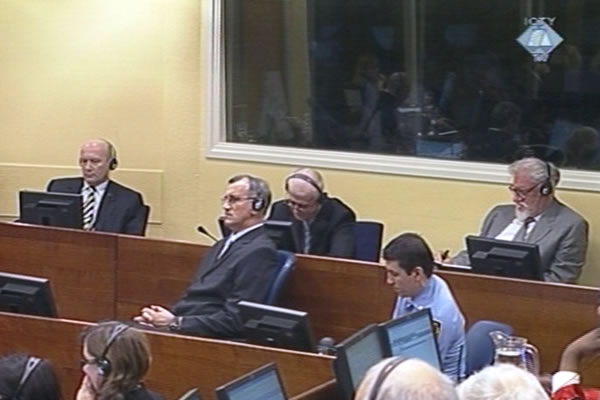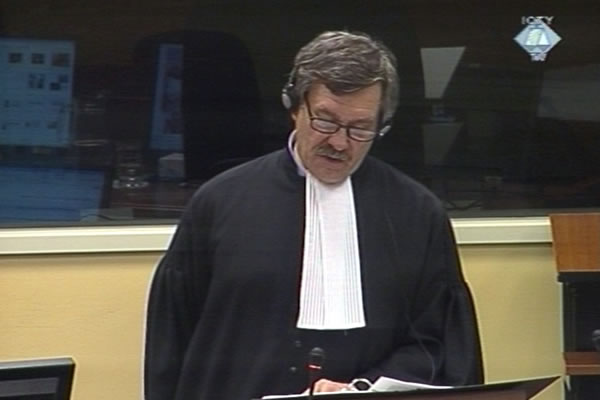Home
ARCHITECTS OF ‘GREATER CROATIA’
Starting the prosecution’s closing argument at the trial of the former Bosnian Croat leaders, prosecutor Scott identified four key points in the joint criminal enterprise aimed at establishing the Greater Croatia, headed by Croatian president Franjo Tudjman and other ‘architects’. The enterprise was run by the Croatian state leadership and the goal was to capture territory, establish a demographic Croatian majority there and make the territory ‘look, sound and feel Croatian’
 Jadranko Prlic, Milivoj Petkovic, Bruno Stojic, Slobodan Praljak, Valentin Coric i Berislav Pusic in the courtroom
Jadranko Prlic, Milivoj Petkovic, Bruno Stojic, Slobodan Praljak, Valentin Coric i Berislav Pusic in the courtroom Prosecutor Kenneth Scott started the closing arguments at the trial of the former Bosnian Croat leaders with a reminder of the HVO crimes in Stupni Do, Dretelj and Mostar in 1993. These ‘terrible and sad’ events are a result of the joint criminal enterprise aimed at achieving a political and military ‘subjugation and elimination’ of the Muslims and other non-Croats in parts of BH territory that were to be annexed to the Greater Croatia, the prosecutor noted.
The prosecutor identified four key points in the joint criminal enterprise. First, the enterprise was organized ‘from top down’, from the nationalist faction in the HDZ headed by Franjo Tudjman, Gojko Susak and Janko Bobetko. The six accused joined in: Jadranko Prlic, Bruno Stojic, Slobodan Praljak, Milivoj Petkovic, Valentin Coric and Berislav Pusic. All of them were the ‘architects’ of that project, the prosecutor claimed.
The second key point of the joint criminal enterprise was to capture the ‘territory’ that coincided with the borders of the erstwhile Croatian Banovina from 1939. As the prosecutor noted, this was not about implementing an abstract, philosophical idea of Croatdom. Croats ‘wanted their sovereign territory, real estate with borders’ where the demographic majority of Croats had to be ensured at the expense of other ethnicities, Scott emphasized. The final, fourth key element in the joint criminal enterprise was ‘Croatdom’, reflected in the need to make sure that the territory ‘should look, sound and feel Croatian’.
The prosecutor reminded the court about Jadranko Prlic’s words on the eve of the indictment against him and five former Bosnian Croat leaders. As Prlic noted, the plan for Herceg Bosna was adopted, proclaimed and supported in Zagreb. There were crimes, Prlic said, and the military segment of the HVO was responsible for them. At a meeting in June 1998, Prlic said that he only did what Tudjman told him to do. In his evidence in his own defense, Slobodan Praljak argued that he had implemented the policies of the Croatian state. Milivoj Petkovic claimed that he obeyed the orders of the Herceg Bosna civilian authorities – Mate Boban, Jadranko Prlic and Bruno Stojic, who is also on trial in this case.
The prosecutor recalled Tudjman’s territorial aspirations towards BH and the role he played in the establishment of Herceg Bosna as an instrument for the implementation of that plan, and then explained the role Mate Boban played when he first assumed the leading role in the BH HDZ and then in the 30 municipalities Croats considered as theirs. This, the prosecutor claimed, despite the fact that the Croats were in the majority in only 12 of those municipalities. ‘This in itself was an act of persecution’, the prosecutor noted. After that, a documentary of the British TV station Channel 4 about the establishment of Herceg Bosna and its main players was shown in court.
In a very detailed account of events that started with the establishment of the Croatian Community of Herceg Bosna and ended with the outbreak of the conflict between the HVO and the BH Army in the second half of 1992, the prosecutor insisted in particular on the agreement on friendship Izetbegovic and Tudjman signed on 27 July 1992. According to the prosecutor, Tudjman tried to accomplish three goals at that meeting – to legalize the presence of the HV in the BH territory, to secure equality of the HVO in the BH armed forces and to obtain guarantees that Herceg Bosna would be recognized as a separate entity. Izetbegovic agreed instead only to make the HVO part of the armed forces together with the BH Army under a unified command. The prosecutor recalled that Slobodan Praljak – at a meeting with Ratko Mladic on 5 November 1992 – said there was no agreement with Izetbegovic and that the agreement on friendship was just a ‘piece of paper’. A year later, Tudjman confirmed it when he said there was no real agreement between him and Izetbegovic.
According to the prosecution, the failure of that meeting faced Tudjman with a dilemma – to withdraw peacefully from the plan to annex Herceg Bosna to Croatia or to take further steps. Unfortunately, Tudjman opted for the latter and pushed BH into another war. According to the prosecution, the war started with the clashes in Prozor.
The prosecution will continue its closing arguments tomorrow.
Photos
Linked Reports
- Case : Prlic et al.
- 2010-12-17 PRLIC’S MOTION DISMISSED
- 2010-12-16 PRLIC: ‘IRRECONCILABLE DIFFERENCES’ AND ‘ANTIPATHY’ AMONG JUDGES
- 2010-09-20 TRIAL OF HERCEG BOSNA LEADERS SUSPENDED
- 2011-02-08 HOW THE ACCUSED CONTRIBUTED TO THE JOINT CRIMINAL ENTERPRISE
- 2011-02-09 PRALJAK’S GOODBYE TO HERCEG BOSNA
- 2011-02-10 PROSECUTION ASKS FOR 220 YEARS' IMPRISONMENT FOR HERCEG BOSNA LEADERS

